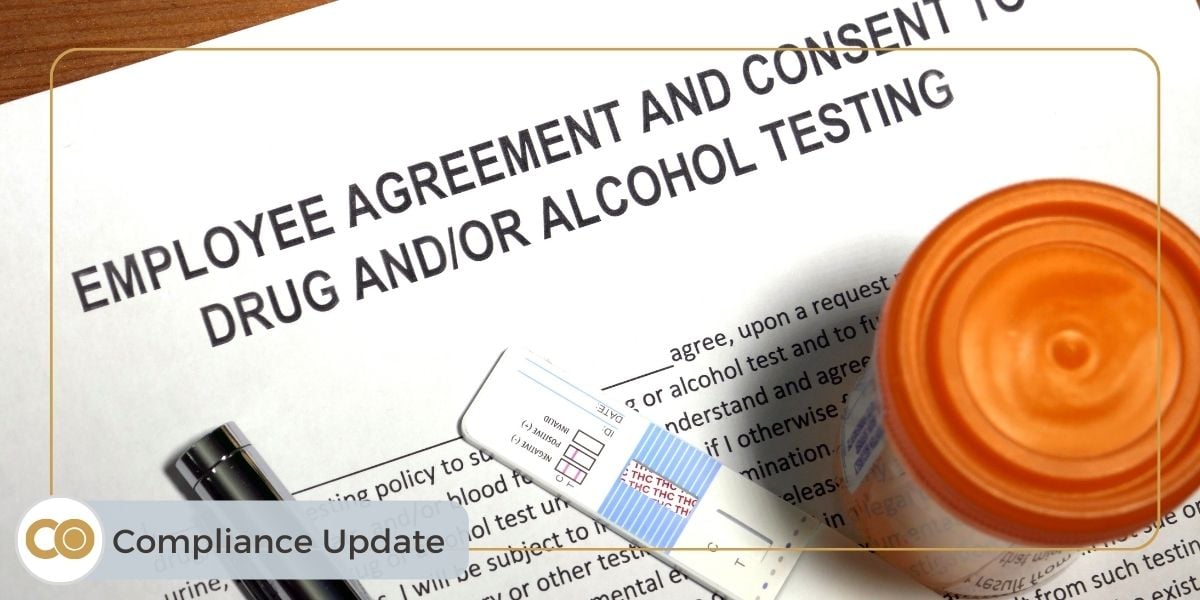Can Employers Still Test for Cannabis? California's New Drug Testing Rules Explained
January 4th, 2024 | 5 min. read

With the introduction of Assembly Bill 2188 (AB 2188) and Senate Bill 700 (SB 700) on January 1, 2024, employees are now protected from discrimination based on legal, off-duty marijuana use.
What does this mean for employers?
Because traditional drug testing methods do not differentiate between previous cannabis consumption and active impairment, California employers have to adapt their approach to drug testing to comply with this new workplace protection.
Have you changed your policies to reflect compliant drug-testing protocols yet?
If not, then this article is for you.
In this article, we will compare traditional drug tests with impairment-focused drug tests that are now required under California’s new cannabis legislation.
By reading to the end, you will learn exactly how to change your workplace drug testing protocols to comply with this landmark law.
Why workplace drug tests need to change to comply with AB 2188 and SB 700
When it comes to California’s new cannabis-related legislation, AB 2188 and SB 700 have steered focus away from recreational marijuana.
Instead, these new laws place emphasis on regulating at-work impairment, aiming to preserve workplace safety without infringing upon employees’ off-duty rights.
Here’s a quick breakdown of AB 2188 and SB 700.
AB 2188: New protections for employee marijuana use
This law marks a significant shift in how employers must view marijuana use among employees. It protects workers from discrimination based on their legal use of marijuana outside of work hours. Essentially, it means that a positive drug test for marijuana cannot be the sole reason for taking adverse employment actions.
SB 700: Enhancing privacy in hiring practices
Complementing AB 2188, SB 700 focuses on the privacy of job applicants. It prohibits employers from asking about or considering an applicant's past cannabis use as part of the hiring process. This law aligns with the growing recognition of cannabis use as a private, personal matter that should not impact an individual's career prospects.
AB 2188 and SB 700 Compliance - What’s in and what’s out?
Here’s a quick snapshot of how California's new cannabis-related legislation affects both applicants and employees.
What’s in?
- Enhanced privacy surrounding past cannabis use.
- Protection of legal, off-duty marijuana use.
What’s out?
- Employer inquiries about historical marijuana consumption.
- Adverse employment actions that are based solely on off-duty cannabis consumption.
But how does it affect employers?
Keep reading to find out!
Learn more about all of 2024's most critical compliance updates
Download our free compliance guide or watch our latest recorded webinar hosted by legal expert, Jason T. Yu, Partner with the law offices of Snell and Wilmer, for a complete breakdown of California's recent regulation changes.
California's compliance challenge – Moving from past detection to current impairment
In response to AB 2188 and SB 700, California employers are navigating a critical shift in drug testing standards. This transition is not just a legal formality – it's a fundamental change in approach, moving from traditional drug testing methods to more nuanced protocols.
Understanding the differences between these old and new testing methods is crucial for employers to ensure compliance.
So, here’s a comparative look at what’s changing.
Traditional drug testing methods
For years, urine and hair tests have been the staples of drug screening within workplaces.
- Urine testing:
A urine test involves analyzing a urine sample to detect the presence of drug metabolites. While urine tests are effective in detecting past drug use, they do not indicate current impairment.- Hair testing:
A hair test analyzes a small sample of hair for the presence of drug metabolites as well. Hair tests also are limited, revealing historical drug use rather than current impairment.
These methods are used to screen for a range of substances including cannabis by testing for drug metabolites, substances produced after active drugs have already been metabolized or broken down, rather than the drugs themselves.
The detection of active drugs indicates impairment. However, the detection of metabolites indicates that a person has previously consumed drugs, not that they are under the influence.
Because they do not distinguish between current and previous drug use, these approaches only paint a picture of past substance use.
Recalling AB 2188 and SB 700, can you see why these traditional drug testing methods pose a problem for employers?
The inability to indicate current impairment is a significant limitation of these traditional testing methods, especially under the new cannabis laws in California.
With employee protections for off-duty and historical cannabis use, these tests are not only ineffective but also noncompliant. In other words, they risk violating the legal rights of employees under AB 2188 and SB 700, potentially exposing employers to fines, lawsuits, and reputational damage.
So, the question, then: How can employers maintain a safe and drug-free work environment while observing California’s new cannabis-related protections?
And the answer: By using drug tests that specifically detect active impairment.
Impairment-focused drug testing methods
For this reason, oral fluid testing and other advanced technologies like breath analysis testing that only detect active drugs instead of drug metabolites are necessary for workplace screening.
Why?
Removing metabolites as a detection factor prevents past drug use from obscuring drug test results. With this in mind, these tests only render a positive result when a person is impaired.
Though testing employees for previous drug use is off limits under AB 2188 and SB 700, testing for a state of impairment is fair game, making impairment-focused drug testing both compliant and effective at preserving a safe and drug-free workplace environment.
- Oral fluid (saliva) testing:
This approach only detects the presence of psychoactive drug components like THC in cannabis. Without registering the presence of drug metabolites, past drug use becomes irrelevant to the screening, allowing the test to zero in on the subject’s immediate condition. Plus, oral fluid testing is capable of instant results, allowing it to effectively assess workplace impairment.- Breath analysis testing:
Breath analysis testing also aligns with compliant drug screening methods. Focused on measuring active drug levels in the system, this technology is similar to alcohol breathalyzers. It specifically targets the presence of psychoactive substances like THC. By concentrating solely on an individual's current state, breath analysis offers a non-invasive and instant way to assess drug influence, making it an effective tool for real-time evaluation of workplace impairment.
In light of these developments, the move towards impairment-focused drug testing methods like oral fluid and breath analysis testing is an essential step for California employers. These methods not only ensure adherence to AB 2188 and SB 700 but also effectively address and alleviate workplace safety concerns.
By prioritizing the detection of current impairment over past drug use, employers are equipped to make well-informed decisions that protect both employee rights and the workplace.
This transition marks a significant and progressive shift in the approach to workplace drug testing, integrating legal compliance with practical and ethical employee management.
A comparative view – Old vs. new workplace drug testing methods
When we compare the old and new methods, it's like comparing a landline to a smartphone – while each has a purpose, the new methods provide functionalities that better align with today's workplace requirements.
New methods provide a shorter window of detection and concentrate on recent use, providing an accurate way to assess active impairment. They also reduce the chances of false positives for past use, offering more current results.
Trading outdated screening protocols for impairment-focused testing enables California employers to not only comply with the law but also foster a culture of trust and transparency by prioritizing employee well-being and respecting their off-duty rights.

Ready to change your drug testing policies and procedures?
Now you know that the introduction of AB 2188 and SB 700 in California marks a significant shift in workplace drug testing protocols.
So, the question, then: How can you transition to these new protocols?
The answer: By partnering with Combined.
Our team of HR and compliance experts is equipped to guide you through the nuances of these new testing methods. Let's work together to ensure your drug testing policies are not only compliant with California's new cannabis laws but also set a higher workplace standard that puts your employees first.
Don’t settle for compliance assistance, get compliance assurance with Combined.
Ready to position your business at the forefront of compliance in 2024?Take action today!
|
Schedule a meeting with an HR specialist to get started! |
If you are not yet ready to speak with a team member, visit our Learning Center for the latest information on employment laws.
This article is not intended to be exhaustive nor should any discussion or opinions be construed as legal advice. Readers should contact legal counsel for legal advice.
.png?width=1125&height=426&name=Your%20paragraph%20text%20(5).png)


